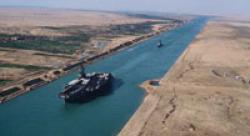
Published date
19 October 1954
The Suez Canal was opened in 1869. As the easiest link to both the Mediterranean and the Indian Oceans, the canal was of great strategic importance. Situated in Egypt and largely owned by the Egyptian ruler at the time, shares in the canal operating company were sold to the British government in 1875. The British invasion of Egypt in 1882 brought the canal and the country of Egypt under full British control, which was maintained by a lease throughout the Second World War.
At the outbreak of the Arab-Israeli War in 1948, Britain attempted to remove its presence from the region, as the cost of maintaining the country and the canal became too great. By the early 1950's, however, it sought to consolidate its position in the Middle East due to the vast oil reserves. Britain was thus determined to maintain its control over the Suez Canal, despite the existence of an Egyptian government and its mounting resistance to British presence. In 1951, the Egyptian government withdrew the 20-year lease stipulated in the Anglo-Egyptian Treaty of 1936. Britain refused to withdraw from the canal, resulting in anti-British protests in which both British citizens and Egyptians were killed. Following a period of relative political instability, a military coup was staged, in which a republic was established under Colonel Nasser. Britain was eager to prevent the further deterioration of relations with Egypt, particularly under its new leadership, and agreed to the Suez Canal Agreement. This was signed on 19 October 1954, and involved the withdrawal of Britain's troops from the region, in exchange for the maintenance of the canal as a British base. The terms of this agreement, however, were short-lived, as Nasser was threatened by Britain's close relations with Iraq and Jordan. Nasser's reaction to Britain's relations with the Middle East resulted in the Suez Crisis of 1956.
Following the disputes over ownership and right of use, the Suez Canal was closed until 1975. Currently, close to 20,000 ships pass through the canal every year.
References
About Geography 'Suez Canal Connects the Red Sea with the Mediterranean Sea",From:About Geography,[online] Available at: www.geography.about.com [Accessed on 19 October 2012]|
Suez Canal "Canal History",From:Suez Canal,[online] Available at: www.suezcanal.gov.eg [Accessed on 19 October 2012]